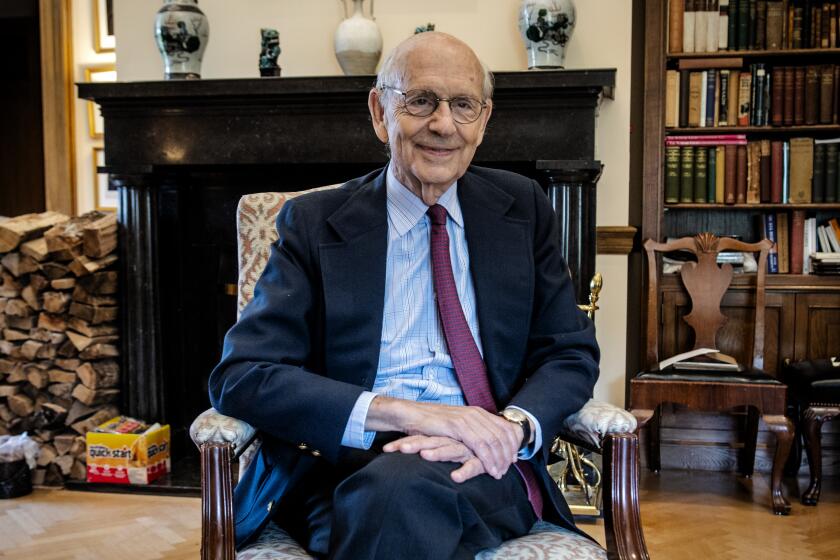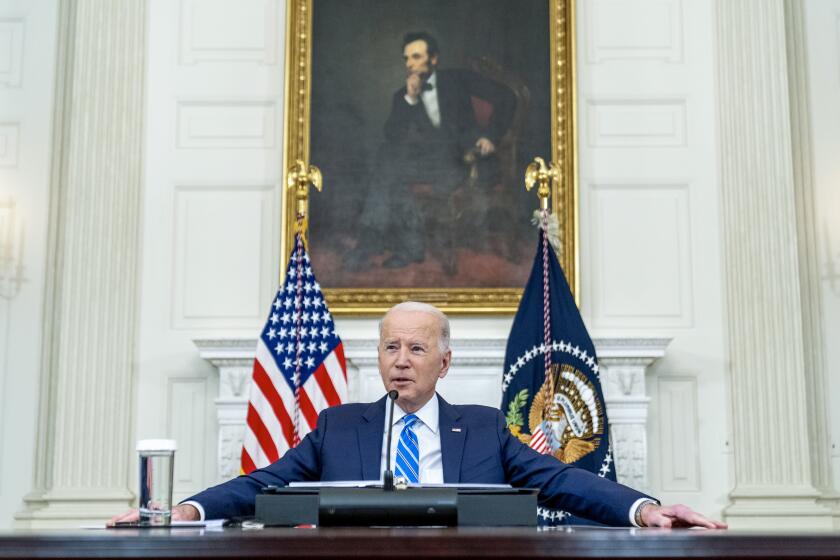Biden vows to appoint a Black woman to the Supreme Court as Breyer makes retirement official

- Share via
WASHINGTON — President Biden praised Supreme Court Justice Stephen G. Breyer, who made his retirement official at the White House on Thursday, vowing that his choice to replace him will be a Black woman and that he plans to announce the choice by the end of next month.
“I’ve made no decision except one: The person I will nominate will be someone of extraordinary qualifications, character, experience and integrity,” Biden said. “And that person will be the first Black woman ever nominated to the United States Supreme Court. It’s long overdue.”
Appearing with Breyer before a small group of reporters in the Roosevelt Room just outside the Oval Office, Biden called it “a bittersweet day for me,” noting that he and Breyer “go back a long way,” and praising him as “an exemplary justice” and “model public servant a time of great division in this country.”
“I’m here today to express the nation’s gratitude to Justice Stephen Breyer for his remarkable career in public service and his clear-eyed commitment to making our country’s laws work for its people,” the president added.
Appointed by President Clinton in 1994, Breyer, 83, is the oldest of the three liberals on a court dominated by conservatives. Stepping to the lectern after Biden, Breyer marveled at America being “a complicated country” and, quoted the opening lines of President Lincoln’s Gettysburg Address that describe a nation “conceived in Liberty, and dedicated to the proposition that all men are created equal.”
“We’re now engaged in a great civil war to determine whether that nation or any nation so conceived and so dedicated can long endure,” Breyer continued, quoting Lincoln and underlining the idea that America’s democratic experiment remained just that.
“An experiment ... it’s an experiment,” he said.
Declaring that experiment remained unsettled, Breyer suggested that the matter would be determined by future generations, Breyer predicted the country would endure. “I’m an optimist,” he said.
After Breyer concluded his remarks, Biden said he planned to invite him and his wife to stay in the White House’s Lincoln Bedroom so they could view a copy of the Gettysburg Address that was handwritten and signed by Lincoln. “Bring your grandchildren, so they can see it as well,” Biden added.
In his official resignation letter, Breyer, a California native, reflected on his time on the court. “I enormously appreciate the privilege of serving as part of the federal judicial system — nearly 14 years as a Court of Appeals judge and nearly 28 years as a Member of the Supreme Court,” he wrote. “I have found the work challenging and meaningful. My relations with each of my colleagues have been warm and friendly.
“Throughout, I have been aware of the great honor of participating as a judge in the effort to maintain our Constitution and the rule of law,” he concluded.
Justice Stephen G. Breyer will retire, clearing the way for President Biden to make his first appointment to the Supreme Court.
His decision to retire at the end of this year’s term in June is partly a matter of political pragmatism. Breyer’s brother Charles, himself a federal judge in California, said in an interview Wednesday that the decision ensures that Biden will be likely able to replace him with a like-minded judge, given that Democrats narrowly control the Senate.
Democrats plan to move expeditiously to confirm Breyer’s replacement in the coming months. Biden, who did not take questions after making his remarks, said he planned to listen to advice from all corners and conduct a rigorous process to determine his choice to replace Breyer. He said he intends to announce his choice “by the end of February.”
Speculation has focused on two potential nominees above all: U.S. Circuit Judge Ketanji Brown Jackson, 51, and California Supreme Court Justice Leondra Kruger, 45.
Jackson was a Supreme Court clerk for Breyer in 1999 and 2000 and was approved by the Senate last March to serve on the U.S. Court of Appeals for the District of Columbia Circuit, filling the seat vacated by Atty. Gen. Merrick Garland.
Kruger served as a law clerk for the late Justice John Paul Stevens.
Others who have been cited as potential nominees are J. Michelle Childs, a federal district judge in South Carolina who is a favorite of Rep. James E. Clyburn (D-S.C.), and Sherrilyn Ifill, the outgoing president of the NAACP Legal Defense Fund.
Clyburn, whose 2020 endorsement helped Biden surge past the Democratic primary field, was pushing publicly for Childs on Thursday, suggesting that she could garner support from Republicans, including her home state’s two GOP senators, Tim Scott and Lindsey Graham. Both “have spoken highly of her,” Clyburn said during a Washington Post event.
“There’s nobody sitting on the Supreme Court today that can tout the background, the experience, life and profession that Michelle Childs would bring to the court,” Clyburn added. “Republicans appreciate that as much as Democrats.”
Republicans, who could regain control the Senate in November’s midterm election, are currently powerless to stop a nomination if all 50 Democrats align behind Biden’s pick. Although given the razor-thin margin, the illness or death of any lawmaker has the potential to change that dynamic and allow the GOP to block the nomination.
In a statement, Senate Minority Leader Mitch McConnell (R-Ky.) said Biden “must not outsource this important decision to the radical left.” Later, speaking to reporters in Kentucky, he said he’d give any nominee “a fair look.”
White House Press Secretary Jen Psaki, asked about Republicans already signaling their likely opposition, offered an implicit response to McConnell, although she did not name him specifically.
“If anyone is saying that they plan to characterize whoever he nominates after thorough consideration with both parties as radical before they know literally anything about who she is, they just obliterated their own credibility,” she said.
The retirement of Supreme Court Justice Stephen G. Breyer provides Democrats a chance to reengerize Black Democratic voters ahead of the midterm.
Although replacing Breyer with another liberal won’t change the makeup of the court, it could help validate Biden and Democrats in the eyes of voters who elected them but have been frustrated by the party’s inability to advance major pieces of its agenda.
Biden’s fulfillment of his campaign promise to appoint a Black woman to the Supreme Court could solidify his support from a key Democratic constituency. On Wednesday, Psaki dismissed the possibility that Biden might nominate Vice President Kamala Harris, California’s former attorney general, to fill Breyer’s seat, telling reporters that he intends to run for a second term in 2024 with her as his running mate.
Biden said Harris would be one of the people he looks to for advice on selecting his nominee.
As Biden and Breyer held court at the White House, the 11 Democrats on the Senate Judiciary Committee were scheduled to meet via videoconference Thursday for a preliminary discussion about how they will manage the nomination process and hearings.
Times staff writers David G. Savage and Jennifer Haberkorn contributed to this report.
More to Read
Get the L.A. Times Politics newsletter
Deeply reported insights into legislation, politics and policy from Sacramento, Washington and beyond. In your inbox three times per week.
You may occasionally receive promotional content from the Los Angeles Times.













